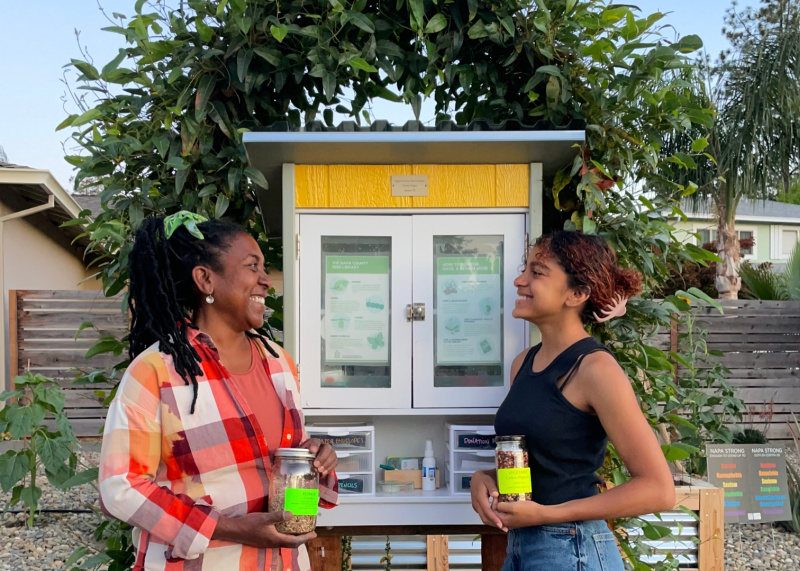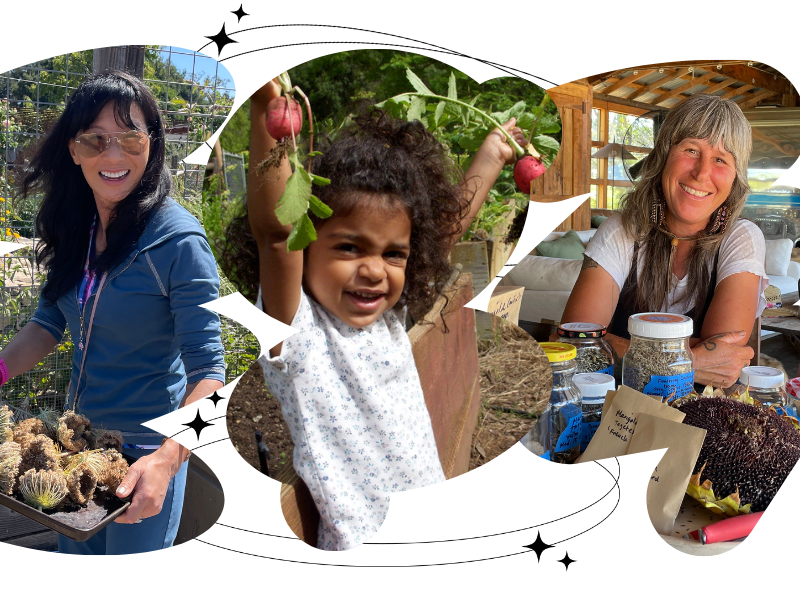Seed libraries: Grow a relationship with your community and help save the world | From the Editor
In neighborhoods around the country, people are joining together to steward the soil, fight hunger, promote well-being, celebrate culture, and forge community ties through seed saving.
 |
|
Lauren and Lavender Muscatine, mother and daughter co-founders of the Napa County Seed Library, created a network of little free seed library annexes in 2020 to promote resiliency and reclaim food sovereignty in their community. |
Is there anything more fundamental than a seed? Horticulture may or may not be your thing, but anyone who eats food should take an interest in seeds.
“Because seeds are so central to people’s cultures and food systems, to control seeds is to control life,” said Michael Fakhri, special rapporteur on the right to food, in a 2021 report to the United Nations on the state of seeds as a human rights concern.
In the last century, the world has lost 75 percent of edible plant varieties as agriculture has abandoned local crops for genetically uniform, high-yielding variants. The rise of genetically engineered (GE) plants has devastated biodiversity, particularly in the United States. GE crops cover half of all American farmland, grown from seeds that are patented and can’t be saved and sown the next year.
Globally, seed is largely controlled by four agrochemical giants: Bayer-Monsanto, BASF, Corteva, and Sinochem, which all also have their hand in pesticide and synthetic fertilizer production. To counter the impact of Big Agriculture, an ongoing, global movement seeks to protect biodiversity and the rights of farmers and Indigenous people to control their seeds. Closer to home, you’ll find aligned efforts on a local scale.
In neighborhoods around the country, people are joining together to steward the soil, fight hunger, promote health and well-being, celebrate culture, and forge community ties through seed saving.
Read: Seeding Community and Hope | From the Editor
Food security = seed security
Seed libraries are nothing new; public libraries have been hosting them for at least a decade. But the pandemic’s impact, particularly on vulnerable populations, underscored the value of these programs.
“There isn’t food security without seed security,” according to Pat Sobrero, founder of the Seed Library at the Round Valley Public Library. Located in Covelo, CA, RVPL serves a remote, rural area, where 95 percent of students qualify for free lunch. It’s a food-insecure community, said Sobrero, speaking at the 11th Annual Seed Summit last month.
Widespread need wrought by the pandemic inspired Lauren Muscatine. She founded the Napa County (CA) Seed Library after COVID-19 hit in 2020. With institutions shuttered, limiting in-person contact, she went about erecting "little seed libraries." Providing free, organic seeds through a network of outdoor libraries across the county, it's the first such program in California, says Muscatine.
Traditionally, library patrons can take what they wish from a seed library, although amounts may be limited to ensure enough to share. In return, users are encouraged to contribute seeds to help restock and diversify the collection. Set up is fairly low-cost; hit up seed companies and local providers for donations. Many libraries have found a seed library is a handy, fun way to repurpose the old card catalog, as Sobrero did at Round Valley. Related programming can range from how-to gardening instruction and available plots on library grounds, to tool lending.
Local organizations, including youth groups, food pantries, and local agencies, are among potential allies. As Muscatine said, presenting alongside Sobrero, “Partners help you reach more people.”
Collaboration is difficult, you say? Noah Lenstra doesn’t buy that. “Wouldn’t it be better, when things are starting to return to normal [post-COVID], we take the time to actually cultivate relationships, so that the next time, we have a relationship in place to respond better to the emergencies that our communities will inevitably face?” said Lenstra, who teaches at the University of North Carolina at Greensboro and founded Let’s Move in Libraries.
Fostering good health and engagement locally, seed libraries connect to a vital, global aspect of sustainability, an ALA core value of librarianship.
Whether you’re considering a seed library or any other initiative, Lenstra’s advice? Just start talking to people.
 |
|
From left: Andrea Morano, Lavender Muscatine, Jennifer Lang. Photos courtesy Napa County Seed Library. |

RELATED
The job outlook in 2030: Librarians will be in demand
The job outlook in 2030: Librarians will be in demand
ALREADY A SUBSCRIBER? LOG IN
We are currently offering this content for free. Sign up now to activate your personal profile, where you can save articles for future viewing







Add Comment :-
Be the first reader to comment.
Comment Policy:
Comment should not be empty !!!